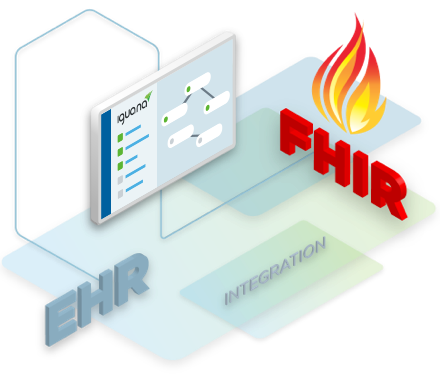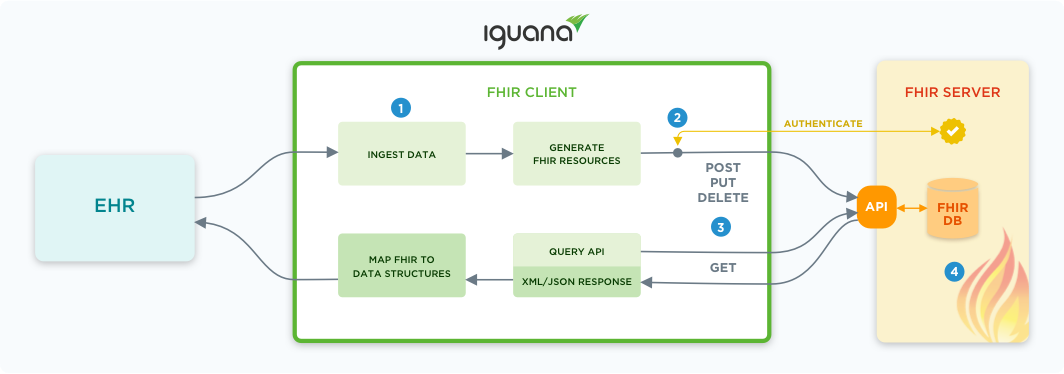THE IGUANA INTEgration ENGINE
FHIR-Based Integration
FHIR (Fast Healthcare Interoperability Resources) is a healthcare data exchange standard that leverages data resources (XML, JSON) and RESTful architecture to power seamless real-time data exchange.
The Iguana integration engine enables you to:
- Quickly set up a FHIR client to interact with FHIR servers
- Ingest and transform data to and from the FHIR format

Why Consider FHIR?
Interoperability With FHIR
To keep up with the rapidly changing digital health standards, you need to adapt - not only to new rules and regulation around FHIR, but also while maintaining compatibility with your existing non-FHIR based systems.
The Future is FHIR
Increasingly many EHRs, payers, pharmacy systems, health systems and more are already using FHIR. It is important to be able to integrate and exchange data between FHIR based servers and non-FHIR based systems.
FHIR Connectivity Requirements
While the adoption of FHIR is still somewhat slow, it is always worthwhile to think ahead as your business scales - and be prepared for any upcoming rules (Eg. from CMS and ONC) about data exchange that require FHIR APIs.
Working With FHIR-Based APIs
Using Iguana As A FHIR Client
The FHIR standard involves modern data formats, web APIs, and authentications that don’t always integrate easily with other standards. Iguana’s development-based approach enables you to connect to anything, future-proofing your integration. Integrate with FHIR servers with no add-ons required.
Generate FHIR Resources
Retrieve data from the source application (e.g. via HL7v2 or database) and easily convert it into FHIR resources, in either JSON or XML format.
Retrieve FHIR Resources
Invoke Iguana to query any FHIR API, and transform FHIR resources to desired data structures that comply with your destination endpoint.
Interface with a FHIR Server
Communicate directly with FHIR servers via standard HTTP REST-based calls (GET, POST, PUT, DELETE), and receive responses in XML or JSON format.
EMR Integration Using FHIR
Build SMART on FHIR applications directly within Iguana to exchange data with EMR systems, enabling easy access to patient data and other relevant clinical information from within the EMR.
Get Started with Iguana
How Iguana Works With FHIR

1. Ingest Data
Iguana can ingest any data format, such as HL7v2, and transform the data to appropriate FHIR Resources based on the FHIR specification.
2. Authenticate
Iguana can authenticate with the FHIR Server supporting industry standards like OAuth2.0.
3. RESTful API Interactions
Iguana can perform different operations against the FHIR Server (ex. GET, PUT, POST, DELETE) to send and receive FHIR resources.
4. FHIR Version Support
Iguana can support any version of the FHIR Standard (STU3, R4, etc.), ensuring compliance with the evolving standard.
Future-proof your integrations with FHIR-based interfaces.
Scalable, Reliable Integration
(4.8)
"In one word, flexibility. We work with HL7, EDI, FHIR, other APIs, flat files like CSVs, etc. There is very little we have run into that we could not accomplish with Iguana."
Talk to a FHIR Integration Expert
FAQs
Does Iguana support FHIR?
Yes. Iguana fully supports FHIR — both the FHIR data model (resources like Patient, Observation, Encounter, etc.) and the FHIR RESTful API standard. With Iguana, you can ingest, transform, and route FHIR resources just like any other data format, and integrate them into your broader healthcare ecosystem.
Can Iguana act as a FHIR client?
Absolutely. Iguana can function as a FHIR client to retrieve or submit resources to FHIR servers, such as the Epic FHIR API. This makes it ideal for pulling data from external systems or synchronizing data across FHIR-enabled services. However, Iguana is not a FHIR server — it doesn’t expose a FHIR API for external systems to query directly.
Can Iguana translate FHIR to and from other healthcare data formats?
Yes. Iguana is purpose-built for data format transformation. You can parse and generate FHIR resources in JSON or XML, and convert them to/from formats like HL7 v2, CDA, X12, CSV, or even custom data formats. This flexibility can be crucial for bridging modern FHIR APIs with legacy systems.
What tools does Iguana offer to help connect with FHIR APIs like Epic’s?
One of the most popular FHIR components included with Iguana is the Epic FHIR Adapter. It provides a ready-to-use framework for authenticating with Epic’s FHIR API using OAuth 2.0 and JWT, and makes it easy to perform common interactions like create, read, search, and other extended operations.
The adapter handles token management securely and comes with sample scripts for creating and querying Patient resources, so developers can quickly get started without needing to build the authentication and API logic from scratch.
Because it's fully customizable, teams can adapt it to fit their specific Epic workflows while still maintaining full control within the Iguana Translator environment.
Can Iguana help with building or validating FHIR resources?
Yes. Iguana includes a FHIR Resource Creator module that makes it easier to construct standards-compliant FHIR resources in Lua, whether you’re generating them from scratch or transforming data from another format like HL7 v2.
For validation and profiling, the FHIR Profiling Tool helps ensure that the FHIR resources you’re working with conform to your organization’s implementation guide or required structure.
Does Iguana come with pre-built FHIR adapters or "plug-and-play" integrations?
Iguana isn’t a plug-and-play platform in the traditional sense — it’s designed for teams that want full control over their integrations. However, Iguana does come with reusable components that significantly reduce development time for common FHIR workflows. These aren’t black-box connectors, but rather well-documented modules your team can adapt and extend as needed.
Will my team need to write code to work with FHIR in Iguana?
Yes. Iguana uses Lua scripting in its Translator environment to build and manage FHIR integrations — including authentication workflows, API calls, and FHIR resource transformations. While the platform takes care of boilerplate tasks like HTTP requests and JSON parsing, your team will still write and maintain scripts to define the logic of each interface. This code-based model gives you full flexibility to work with any FHIR resource, endpoint, or data mapping scenario — without the limitations of plug-and-play tools.
If FHIR integration in Iguana requires code, will we be on our own?
Not at all. While Iguana gives you the flexibility to script custom FHIR integrations, it also provides the tools and support to make development efficient and approachable. You’ll have access to pre-built components (like our Epic FHIR Adapter, FHIR Profiling Tool, and FHIR Resource Creator), shared code libraries, and intelligent development features such as autocompletion, real-time debugging, and live output previews. And if you need help, our expert support team is always available whenever you need guidance.
Does iNTERFACEWARE provide managed FHIR integration services?
No, iNTERFACEWARE does not provide a managed integration service. We offer Iguana, a self-hosted integration engine that puts your team in full control. You develop, deploy, and maintain your integrations internally, using Iguana's platform and tools. This model gives you long-term flexibility, eliminates vendor lock-in, and ensures that integration capabilities grow alongside your organization's needs.
Who typically uses Iguana for FHIR integration?
Iguana is designed for teams that want to build and manage their own integrations — typically healthcare software vendors, hospital IT departments, and developers.
To use Iguana effectively, you’ll need access to a developer or technical team. It’s a code-based platform, so programming is required. If you’re new to FHIR, we offer coding templates and tools can help you get started. But if you don’t have technical resources in-house or through a partner, Iguana likely won’t be the right fit.
What kind of support can I expect from iNTERFACEWARE?
You can expect responsive and knowledgeable support from a team that understands FHIR integration. We provide email and phone support, detailed documentation, and training resources to help your team succeed. For more hands-on help, our professional services team is available to assist with specific projects or ongoing needs.
Whether you're exchanging data through FHIR APIs, working with FHIR resources, (or other formats and protocols), we're here to help guide you through the process. Many of our customers cite the quality of our support as one of the main reasons they chose Iguana.